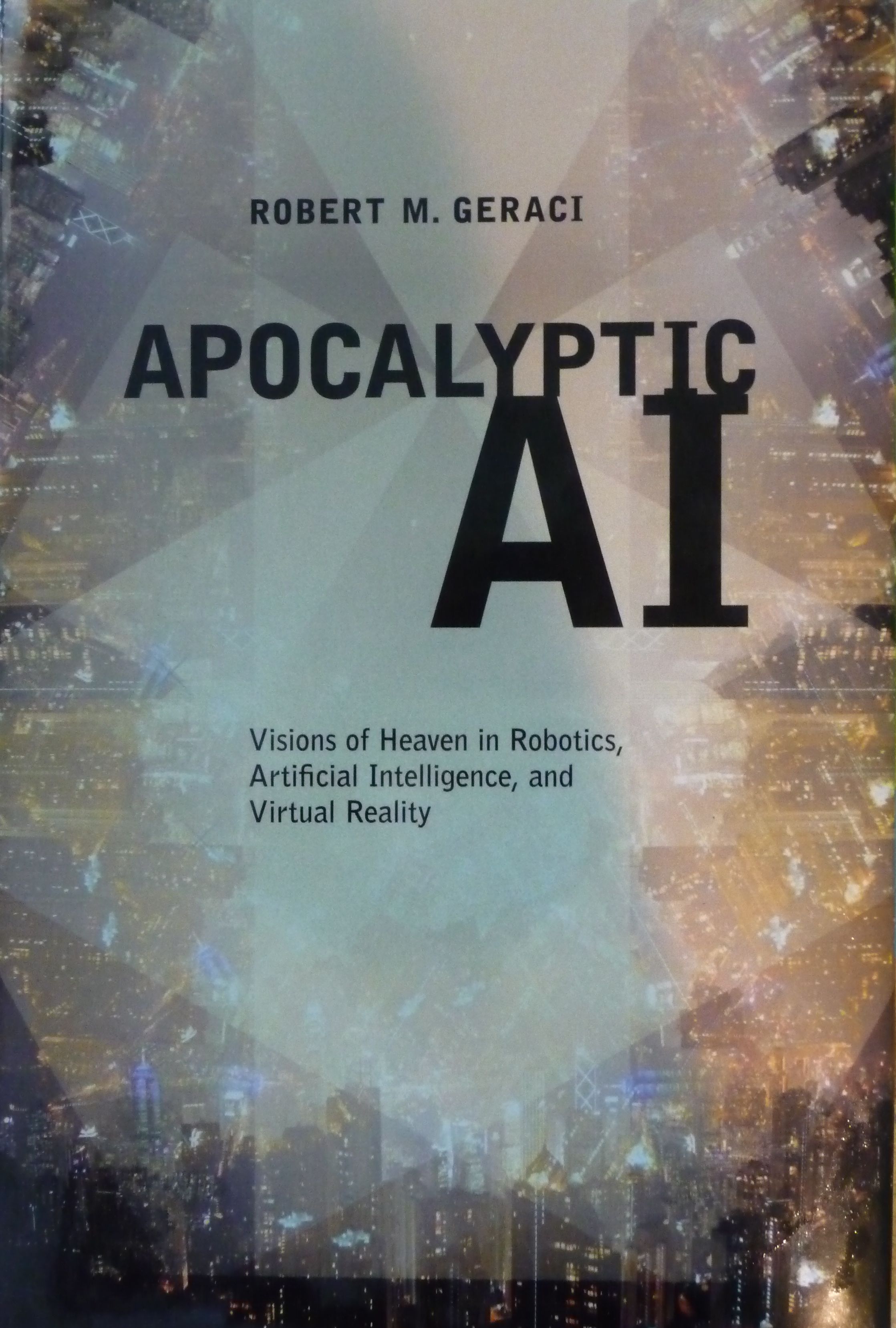

There is a great scene in the movie The Social Network when Napster co-founder Sean Parker (Justin Timberlake) walks into a New York restaurant and talks about the future of the Internet with Mark Zuckerberg (Jesse Eisenberg) and Eduardo Saverin (Andrew Garfield).
The Internet is about to change the world forever, and Sean Parker knows it. That is what puts the crazy gleam in his eye and makes him talk fast. Napster was shut down by a court injunction, but as he says, "Want to buy a Tower Records?" Right then The Social Network sparks with nervous energy.
"People will live on the Internet," Parker says.
Thinking in Thin Air
Living on the Internet is one of the thousand-mile-high ideas explored by Robert M. Geraci in his book Apocalyptic AI: Visions of Heaven in Robotics, Artificial Intelligence, and Virtual Reality.
Apocalyptic AI is "the hope that we might one day upload our minds into machines or cyberspace and live forever."
Geraci is a rigorous and careful writer, and he needs to be. His task is to guide readers up the Apocalyptic AI mountain, where the way is treacherous and the air is thin. Science-fiction writers work with big ideas in the form of stories. Futurists just work with big ideas. Apocalyptic AI is mostly about futurists.
Consider the following sentence:
"Transhumanism (commonly abbreviated H+) is a religious movement brought to Second Life by individuals who see the virtual world as the perfect realm for the realization of Apocalyptic AI's Mind Fire" (p 84)
You might wonder what Mind Fire is.
Mind Fire is a term invented by Hans Moravec, a computer scientist who founded the Mobile Robot Lab at Carnegie-Mellon University in Pittsburgh, Pennsylvania. It refers to the future rampant spread of "cyberspace computation" throughout the universe and the introduction of the Age of Mind. "In the Age of Mind, physical reality will lose relevance as it is alchemically transmuted into cyberspace" (p 34).
In other words, people will live on the Internet.
It's Complicated
If you uploaded a copy of your mind into cyberspace and continued to exist on Earth, wouldn't you have two lives?
Surely the earthly self would wonder what the cyberspace self was doing. Would there be reports? If so, would the reports cause envy? For whom?
The problems inherent in waiting until the last minute to upload your mind are obvious. The brain is wetware, subject to time.
Here's another scenario: at age thirty-two you save a copy of your brain as silicon, with instructions to upload that copy into cyberspace on your death. That way, you would get to be thirty-two years old forever.
Your cyberself would miss out on the years you lived on earth past age thirty-two, but your physical self could preserve the memories. You could experience your 32-up life through words, images, video, and music. It might be a bit like attending your own funeral, but since you cheated death, it is also possible that you would mourn as one who could be comforted.
But It's Time to Come Down Now
Right now mind uploading is fictional gold. Maybe it will be possible one day.
Right now Second Life gamers can build paradise (or something else; the options for what you build seem unlimited). They can live there as long as the electricity is flowing and the Internet is running clear.
However, the meanest, poorest fiction writer who ever lived can tell you exactly what is happening in Second Life and other similar massively multiplayer online games (MMOGs). They are writing fiction. People make up characters and then the characters take over the story. It happens all the time.
The difference is that the imaginary worlds in MMOGs are constantly being invented and reinvented. This type of fiction is more personal and as a result, more seductive.
Powerful but Not New
In the sense that bonds formed in cyberspace come from mind-to-mind contact, they are transcendent. What they aren't is new.
People have been bonding that way forever. Words and images have been conveying messages as long as there have been words and images. I feel bonded with writers I have never met and never will. When I lived in Washington, DC, I took the subway down to the Smithsonian just so I could look at Vermeer's Woman Holding a Balance again. I remember staying a long time.
